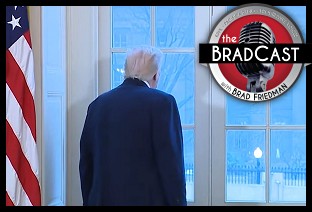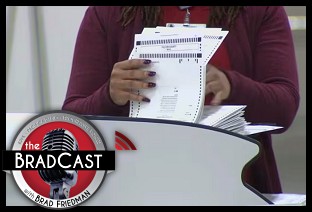 A new bill that would grant unprecedented and unchecked powers to the California Sec. of State --- including those that could allow him or her to approve new e-voting systems for use in actual elections with no testing at all --- was approved late last week by the state legislature along partisan lines. It is now on its way to Gov. Jerry Brown (D) for his signature or his veto.
A new bill that would grant unprecedented and unchecked powers to the California Sec. of State --- including those that could allow him or her to approve new e-voting systems for use in actual elections with no testing at all --- was approved late last week by the state legislature along partisan lines. It is now on its way to Gov. Jerry Brown (D) for his signature or his veto.
The Governor should veto SB 360, a sweeping, dangerous, ill-conceived and dishonestly presented piece of legislation, passed with little debate in public or in either chamber of the state legislature.
The measure has been, and is being, deceptively sold to the public and to state lawmakers as necessary to allow CA counties --- specifically Los Angeles County --- to "develop, own and operate public voting systems". In fact, the bill does much much more than that. What it actually does, among other things, is end the long-standing requirement that all electronic voting systems used in the state be tested and certified at the federal level before being allowed for use in California.
The bill also includes a provision allowing for new voting systems to be used in "pilot programs" during "a legally binding election", before the systems have been certified by the state in any way. That, in effect, could allow a new system to be used in an actual election, by actual voters in the Golden State, without any independent testing whatsoever, depending on a Secretary of State's interpretation of this poorly drafted bill. That should be a serious concern to all voters --- particularly given the massive flaws already discovered in e-voting systems used across the state (and country) that were subjected to independent testing by both federal and state authorities before use.
In other words, SB 360, as approved by the state legislature, does away with all federal testing for voting systems used in California, and, to make matters worse, grants the Secretary of State sole power to approve e-voting systems for use in actual elections --- even without certification testing by state auditors either.
As if all of that is not bad enough, the bill's Democratic author, state Senator Alex Padilla --- a leading 2014 candidate for CA Sec. of State himself --- has been misleadingly pitching the bill as necessary in order to allow for the use of non-proprietary, publicly-owned voting systems in the state. But, in fact, CA already allows the use of non-proprietary, publicly-owned voting systems. In fact, the voting system currently in use across L.A. County --- the largest voting jurisdiction in the nation, with more voters than 36 actual states --- is already publicly-owned!
Such facts were not been mentioned by Padilla during his office's advocacy for the bill, and they have failed to respond to our multiple queries on that point and several others since the bill was initially introduced earlier this year. Instead, the state Senator and SoS candidate continues to dishonestly pitch the bill to the public, as evidenced again in his Friday press release (posted at the bottom of this article), touting the bill's approval by the state legislature.
"Allowing counties to develop, own and operate voting systems will increase voter confidence in the integrity of our elections," Padilla is deceptively quoted, in bold text, as saying in a number of press releases in support of the bill, including Friday's release. He then adds misleadingly (since we already have such a system here in Los Angeles): "A public voting system will be more transparent, instill public trust, be more accountable and provide greater access to all voters."
In short, SB 360 is a dangerous, irresponsible bill which fails to learn from the recent history of previously irresponsible and/or corrupt Secretaries of State, completely rewrites the state's election code to allow for less testing, rather than more, of the state's already-buggy and insecure collection of e-voting systems, and it's being sold dishonestly to the public and lawmakers by a legislator who is very likely to be the recipient of its new, sweeping, unprecedented, executive powers...
Federal testing no longer required
 We had hoped to write about SB 360 in more detail previously and, in fact, discussed some of its most troubling aspects --- the abolishment of the long-standing security requirement that CA e-voting systems receive independent federal testing and certification before being tested and approved for use in the state --- with Los Angeles County Registrar-Recorder/County Clerk Dean Logan earlier this year. (See our detailed article here.)
We had hoped to write about SB 360 in more detail previously and, in fact, discussed some of its most troubling aspects --- the abolishment of the long-standing security requirement that CA e-voting systems receive independent federal testing and certification before being tested and approved for use in the state --- with Los Angeles County Registrar-Recorder/County Clerk Dean Logan earlier this year. (See our detailed article here.)
Logan is currently heading up the creation and development of a new, publicly-owned electronic voting system for L.A. County. The county has indicated they hope to subsequently sell the new system to others in the state and across the country. Logan is a supporter of SB 360. He explained, during our exclusive interview with him earlier this year, that the measure was needed because, among other reasons, the current system of federal testing and certification at the U.S. Elections Assistance Commission (EAC) "is completely broken right now," in light of Congress' inability to confirm the four Commissioners that are supposed to head up the federal agency.
As we detailed in April, however, Logan's claims were directly disputed by the EAC itself. The EAC's Director of Testing and Certification Brian Hancock explained to The BRAD BLOG that the federal testing and certification regime at the agency is operating just as it has been for many years, even in the absence of political appointees at the top. "We continue to test and certify voting systems uninterrupted by our lack of Commissioners," Hancock told us in direct response to Logan's assertions at the time.
Jessica Myers, an EAC Certification Program Specialist also confirmed that same point after we spoke with Logan. When we asked her if they were still up and running as usual, she responded: "Yes, that is correct. We are still testing and certifying voting systems. We post a weekly update of the progress of the test campaigns on the EAC blog." Those weekly blog updates continue to be posted here.
The article based on our interview with Logan last April --- detailing his work on plans for what will likely be a new, 100% unverifiable touch-screen voting and tabulation system for the county --- went into some detail on this disturbing aspect of SB 360. It also included more details from the EAC disputing each of the claims made by Logan and by others in support of the bill, in regard to the supposed need to do away with all federal testing for CA voting systems.
Since then, we have withheld additional comment on the bill here in hopes of receiving a response to our specific questions from Padilla's office. We asked several times in the spring, but received no response in return. Last week, as the legislation sailed through the Assembly, we fruitlessly inquired once again. The lack of response to our queries would seem to underscore the deceptive nature of Padilla's bill, since his office --- once responsive about the bill, until we sent questions detailing our concerns --- has failed to respond to all of our repeated attempts to receive answers.
For example, here are the questions we sent last week to Padilla, which neither he nor his office have responded to:
+ Why is this bill being sold as needed to allow for public ownership of LA County's voting system, when LA County already has a publicly-owned voting system and is already allowed, by law, to develop another if they wish?
+ Does this bill give the CA Sec. of State the unilateral ability to approve voting systems for use in actual elections, even without testing at all, as in pilot programs, etc.?
One of the reasons we haven't gone into more detail on this deeply troubling bill until now is because we wanted to fairly represent the Senator's point of view here. His lack of response, however, did little more than delay our coverage of the dangerous legislation which, short of a Gubernatorial veto, is now set to soon become law.
As one observer in Sacramento told us last week, on the day the bill sailed through the lower chamber: "The bill was just presented on the Assembly floor by the Speaker himself. There was no debate. It passed 52-21."
No testing required at all?!
Indeed, while CA already allows for publicly-owned voting systems, funding for the development of a new publicly-owned system is not currently available by state law. Hundreds of millions of dollars in funding from either the federal Help America Vote Act of 2002 or the state's Voting Modernization Bond Act of 2002 (Prop 41) is only available for use with federally tested and certified voting systems. A change in state law would be required to free up those monies to allow a state or county entity to contract for the development of a new system which has not already passed federal muster. Padilla's original, 4-page bill filed in February this year, did exactly that and little more. That version of the bill would have allowed L.A. to develop its own new system to replace its existing publicly-owned system, but it would still have required that the new system receive federal certification before being used in an actual election.
Months later, the once-simple, 4-page bill that amended just three sections of the state Election Code has turned into a 39-page mess that radically alters, rewrites, amends, repeals and otherwise changes more than 70 sections of the current state Election Code.
The bill is such a mess that our reading of the confusingly-worded text finds that the CA Sec. of State, under SB 360, would be granted the power to approve new systems that "need not be certified or conditionally approved prior to its experimental use in a pilot program" for "a legally binding election." According to the bill, however, such uncertified systems can only be used in such a "pilot program" if they meet or exceed the certification testing standards of the federal EAC.
How would anybody know if such a pilot system, used in real elections, meets or exceeds those standards if no federal or state agency has tested them to determine if they do? That point appears unexplained in the legislation. Most of those that we've talked to, including a number of supporters of the bill who preferred to remain off-record while noting some of its contradictions and flaws, were unable to explain the apparent internal feedback loop.
Others confirmed the concerns we cited in the language concerning pilot programs. Still others suggested that the developers of the new voting systems might simply affirm to the Sec. of State that their own system meets or exceeds the federal standards. As is, the legislation requires that failures and flaws of systems used during pilots in real elections only need to be self-reported to the Secretary of State by the entity running the pilot program itself. In the case of L.A. County, the developers of the new system, they would be responsible for self-reporting any bugs, flaws or disasters they discovered while using their new, uncertified systems in live elections.
Jim Soper, co-chair of the Voting Rights Task Force in California, a non-profit watchdog organization, cited a possible explanation (or a contradiction, depending on how you read the law) for the question of how anyone can know if a voting system proposed for use in a pilot program actually meets federal EAC standards without actually going through federal or state certification testing. He pointed us to a different section of the legislation which reads: "The Secretary of State shall use a state-approved testing agency or expert technicians to examine and test voting systems or parts of voting systems proposed for use or sale in this state."
"However," Soper notes, "what is involved in the testing, to what standards, and who does the testing is not clearly delineated."
Soper, who also served as an adviser to the San Francisco Board of Supervisors from 2009 to 2011 as a member of the San Francisco Voting Systems Task Force, went on to add that, in the seemingly contradictory provision, "it's not even specified if the system must pass the test before being used." So, by the most generous interpretation of this ill-considered and poorly-worded bill, the system in question only needs to be tested before being used in "a legally binding election" --- but it doesn't even need to pass the test!
No fan of the EAC
For the record, few, if any, have been more critical of the EAC and their testing standards over the last decade than The BRAD BLOG. If you don't believe us, search our site for some of our coverage --- or just ask them yourselves. Suffice to say, we have been no fan. Many of the arguments offered by supporters of the bill are true. (Some of the bill's supporters are well-respected election integrity advocacy groups such as Common Cause California and Verified Voting, the current Secretary of State Debra Bowen, and the National Association of Latino Elected and Appointed Officials which is headed by its President...Alex Padilla!)
Supporters argue, for example, that the EAC has always done a lousy job of testing electronic voting systems and that the federal agency can't update their current testing standards until the vacancies on their Board of Commissioners are filled by confirmation of a dysfunctional U.S. Congress.
Those points are certainly valid. Still, it should go without saying that more testing is better than less testing when it comes to our nation's historically flawed e-voting systems. Yet, SB 360 removes an entire layer of testing, the one first done at the federal level, and then allows the CA Secretary of State to single-handedly approve that system for a "pilot", potentially without any independent testing at all.
Simply because the state of California, under SB 360, would supposedly be required to test new systems to current EAC standards before they are certified by the Sec. of State (but not before that same Sec. of State may allow them for use in "a legally binding election"!), should offer little comfort to voters as a reasonable excuse for not requiring systems be certified by an independent federal body as well. History, as well as hundreds of pages of this website, are littered with stories of voting system testing protocols and processes which failed to discover incredibly serious flaws in voting system hardware and software until it was too late. Indeed, even CA's current system of requiring federal testing and certification before state testing and certification may take place, has resulted in the later discovery of scores of very serious security flaws in every voting system in use in the state, some of which have later led to those systems being decertified for use.
Removing a complete layer of required independent testing --- whether that testing is less thorough than we all might like --- after a decade of electronic voting systems needing to be decertified and later conditionally re-approved for use with extraordinary security precautions applied in hopes of mitigating gaping flaws that went initially unnoticed, even with both state and federal testing in place, seems imprudent, to say the least. Allowing for provisions that will allow such systems to be used in actual elections with no testing at all seems like utter madness, playing with fire, and something this state should know very well not to do --- particularly given its sordid history of e-voting system disasters.
Why worry?
Some might ask, particularly Democrats, who seem confident that the outgoing term-limited Democratic Sec. of State Debra Bowen is likely to be replaced in 2014 by another Democrat: "What's the big concern? No Secretary of State would approve an untested voting system for use in an actual election!"
Those Democrats need only look a few years back to when Democratic Sec. of State Kevin Shelley was forced out of office mid-term in 2005. Shelley had previously decertified Diebold's touch-screen voting systems in California, after it was discovered the company had lied to the state about using uncertified and unsafe components. The Republican governor at the time, Arnold Schwarzenegger (who had, himself, replaced Democratic Gov. Gray Davis in an unprecedented recall election held on many of those same machines) subsequently appointed a Republican, Bruce McPherson, to take the place of the Democrat Shelley as Secretary of State.
After a series of independent tests in other states discovered massive security issues with the same family of Diebold systems that Shelley had decertified, and after McPherson's own state testers subsequently both confirmed those security flaws and found 16 other bugs they described as "a more dangerous family of vulnerabilities" which "go well beyond" what was discovered elsewhere, Schwarzenegger's hand-picked Sec. of State McPherson went ahead and recertified the Diebold touch-screen systems for use anyway in 2006. He ignored the dire warnings from his own security and testing team. Later, after Democratic Sec. of State Debra Bowen was elected and her landmark "Top-to-Bottom Review" of all CA e-voting systems discovered even more enormous security flaws in those very same systems in 2007, the same touch-screen systems were decertified by the state once again.
It is for a good reason that state law, until SB 360, made it impossible for a single person to approve electronic voting systems for use in actual elections without independent testing by a federal body. There was a well-considered reason that California had some of the most stringent rules requiring systems to be federally certified before they could even be considered for use in a state election. Those reasons, it seems, are apparently of little concern to the current crop of Democratic elected officials in the state legislature. SB 360 passed both chambers on strict party lines (with one exception) on Friday and will become state law on January 1, 2014, if signed by Gov. Jerry Brown.
UPDATE: You can contact Governor Jerry Brown with your opinion on SB 360 right here. (Choose "SB00360" from the "Please choose your subject" dropdown box, and select Pro or Con on the next screen.) The link to this article is: https://bradblog.com/?p=10242.
Last week's press release from SB 360's author, and declared candidate for Sec. of State, state Sen. Alex Padilla (D), follows below...
September 6, 2013
Counties Would Be Allowed to Develop, Own & Operate Voting Systems
Sacramento - Senate Bill 360 by Senator Alex Padilla (D-Pacoima) is headed to the Governor's desk. The bill would allow California counties to develop, own and operate public voting systems, subject to approval and certification by the California Secretary of State.
Most California counties purchase their voting systems from one of five private vendors. The vendors offer a variety of systems and upgrades which has resulted in a patchwork of technologies throughout our state. The private vendors consider their technology proprietary and limit public access to both the operating software and hardware. Currently, state election officials and the public are completely dependent upon these vendors, who are under no legal obligation to notify federal election officials or the public when their voting systems malfunction, have vulnerabilities or defects.
"Allowing counties to develop, own and operate voting systems will increase voter confidence in the integrity of our elections," said Senator Alex Padilla. "A public voting system will be more transparent, instill public trust, be more accountable and provide greater access to all voters," Padilla added.
Los Angeles County, the largest county in the nation, is seeking to develop its own system. In 2009, the Los Angeles County Registrar/County Clerk launched the Voting Systems Assessment Project (VSAP) with the goal of replacing its 30-year-old system. L.A. County is the most populated and geographically expansive county in the U.S. and the most complex election jurisdiction in the nation. The county has 10 million residents and over 500 political districts spread across 4,000 square miles. L.A. County decided to develop its own system after concluding that private vendors could not meet the county's unique needs. SB 360 facilitates that process subject to the approval and system certification by the California Secretary of State.
Senator Alex Padilla, 40, graduated from MIT with a degree in Mechanical Engineering. He currently serves on the Board of MIT and is President of the National Association of Latino Elected and Appointed Officials. He is Chair of the Senate Energy, Utilities and Communications Committee and represents the more than 1,100,000 residents of the 20th State Senate District in Los Angeles. For more information about Senator Padilla visit his website or follow him on Facebook.


 It's About Elections and the Windmills of His Mind: 'BradCast' 1/29/26
It's About Elections and the Windmills of His Mind: 'BradCast' 1/29/26 'Green News Report' 1/29/26
'Green News Report' 1/29/26
 Govt Shutdown Over ICE Funding Near Certain This Weekend: 'BradCast' 1/28/26
Govt Shutdown Over ICE Funding Near Certain This Weekend: 'BradCast' 1/28/26 Trump Blinks, Bovino Out, MN Op Falters but Continues as Midterm Accountability Looms: 'BradCast' 1/27/26
Trump Blinks, Bovino Out, MN Op Falters but Continues as Midterm Accountability Looms: 'BradCast' 1/27/26 'Green News Report' 1/27/26
'Green News Report' 1/27/26 The ICE Murder of ICU Nurse Alex Pretti and the Heroes of Minneapolis: 'BradCast' 1/26/26
The ICE Murder of ICU Nurse Alex Pretti and the Heroes of Minneapolis: 'BradCast' 1/26/26  The BRAD BLOG: 22 Years and Still Counting
The BRAD BLOG: 22 Years and Still Counting Sunday 'Worth a Thousand Words' Toons
Sunday 'Worth a Thousand Words' Toons Mr. Smith Testifies (Publicly) in Washington: 'BradCast' 1/22/26
Mr. Smith Testifies (Publicly) in Washington: 'BradCast' 1/22/26 'Green News Report' 1/22/26
'Green News Report' 1/22/26 World Turning Against Self-Destructing U.S. Under Trump: 'BradCast' 1/21/26
World Turning Against Self-Destructing U.S. Under Trump: 'BradCast' 1/21/26 Trump Admin Waste, Fraud, Abuse on Voting, at DOJ, by DOGE: 'BradCast' 1/20/26
Trump Admin Waste, Fraud, Abuse on Voting, at DOJ, by DOGE: 'BradCast' 1/20/26 'Green News Report' 1/20/26
'Green News Report' 1/20/26 Sunday 'Domestic Terrorist' Toons
Sunday 'Domestic Terrorist' Toons 'Green News Report' 1/15/26
'Green News Report' 1/15/26 'A Cornered Rat': Trump Terrorizes Minneapolis, Menaces NATO, World: 'BradCast' 1/15/26
'A Cornered Rat': Trump Terrorizes Minneapolis, Menaces NATO, World: 'BradCast' 1/15/26 'Not Close to Over': Mad King Trump in Venezuela (& Beyond): 'BradCast' 1/14
'Not Close to Over': Mad King Trump in Venezuela (& Beyond): 'BradCast' 1/14 Things Getting Weirder as Trump Keeps Losing: 'BradCast' 1/13/26
Things Getting Weirder as Trump Keeps Losing: 'BradCast' 1/13/26 After ICE Murder in MN, Local Cops Disown Fed Policing Practices: 'BradCast' 1/12/26
After ICE Murder in MN, Local Cops Disown Fed Policing Practices: 'BradCast' 1/12/26 Trump to Congress, Climate, U.N., Rule of Law: DROP DEAD - 'BradCast' 1/8/26
Trump to Congress, Climate, U.N., Rule of Law: DROP DEAD - 'BradCast' 1/8/26 'Nonsense': Trumpers Claim 315k Fraudulent GA Votes in 2020: 'BradCast' 1/7/26
'Nonsense': Trumpers Claim 315k Fraudulent GA Votes in 2020: 'BradCast' 1/7/26 Jack Smith Testimony on Trump J6 Crimes, DOJ Weaponization: 'BradCast' 1/6/26
Jack Smith Testimony on Trump J6 Crimes, DOJ Weaponization: 'BradCast' 1/6/26 Trump War on Venez. is About Ego, Power, 'Alien Enemies Act': 'BradCast' 1/5/26
Trump War on Venez. is About Ego, Power, 'Alien Enemies Act': 'BradCast' 1/5/26
 VA GOP VOTER REG FRAUDSTER OFF HOOK
VA GOP VOTER REG FRAUDSTER OFF HOOK Criminal GOP Voter Registration Fraud Probe Expanding in VA
Criminal GOP Voter Registration Fraud Probe Expanding in VA DOJ PROBE SOUGHT AFTER VA ARREST
DOJ PROBE SOUGHT AFTER VA ARREST Arrest in VA: GOP Voter Reg Scandal Widens
Arrest in VA: GOP Voter Reg Scandal Widens ALL TOGETHER: ROVE, SPROUL, KOCHS, RNC
ALL TOGETHER: ROVE, SPROUL, KOCHS, RNC LATimes: RNC's 'Fired' Sproul Working for Repubs in 'as Many as 30 States'
LATimes: RNC's 'Fired' Sproul Working for Repubs in 'as Many as 30 States' 'Fired' Sproul Group 'Cloned', Still Working for Republicans in At Least 10 States
'Fired' Sproul Group 'Cloned', Still Working for Republicans in At Least 10 States FINALLY: FOX ON GOP REG FRAUD SCANDAL
FINALLY: FOX ON GOP REG FRAUD SCANDAL COLORADO FOLLOWS FLORIDA WITH GOP CRIMINAL INVESTIGATION
COLORADO FOLLOWS FLORIDA WITH GOP CRIMINAL INVESTIGATION CRIMINAL PROBE LAUNCHED INTO GOP VOTER REGISTRATION FRAUD SCANDAL IN FL
CRIMINAL PROBE LAUNCHED INTO GOP VOTER REGISTRATION FRAUD SCANDAL IN FL Brad Breaks PA Photo ID & GOP Registration Fraud Scandal News on Hartmann TV
Brad Breaks PA Photo ID & GOP Registration Fraud Scandal News on Hartmann TV  CAUGHT ON TAPE: COORDINATED NATIONWIDE GOP VOTER REG SCAM
CAUGHT ON TAPE: COORDINATED NATIONWIDE GOP VOTER REG SCAM CRIMINAL ELECTION FRAUD COMPLAINT FILED AGAINST GOP 'FRAUD' FIRM
CRIMINAL ELECTION FRAUD COMPLAINT FILED AGAINST GOP 'FRAUD' FIRM RICK SCOTT GETS ROLLED IN GOP REGISTRATION FRAUD SCANDAL
RICK SCOTT GETS ROLLED IN GOP REGISTRATION FRAUD SCANDAL VIDEO: Brad Breaks GOP Reg Fraud Scandal on Hartmann TV
VIDEO: Brad Breaks GOP Reg Fraud Scandal on Hartmann TV RNC FIRES NATIONAL VOTER REGISTRATION FIRM FOR FRAUD
RNC FIRES NATIONAL VOTER REGISTRATION FIRM FOR FRAUD EXCLUSIVE: Intvw w/ FL Official Who First Discovered GOP Reg Fraud
EXCLUSIVE: Intvw w/ FL Official Who First Discovered GOP Reg Fraud GOP REGISTRATION FRAUD FOUND IN FL
GOP REGISTRATION FRAUD FOUND IN FL

































